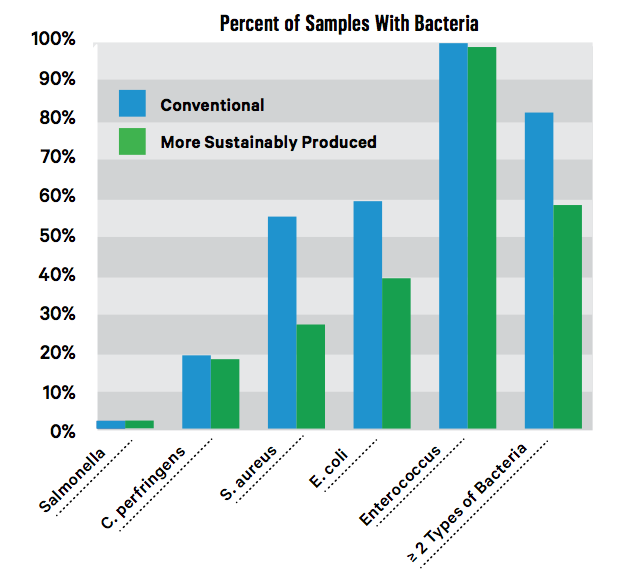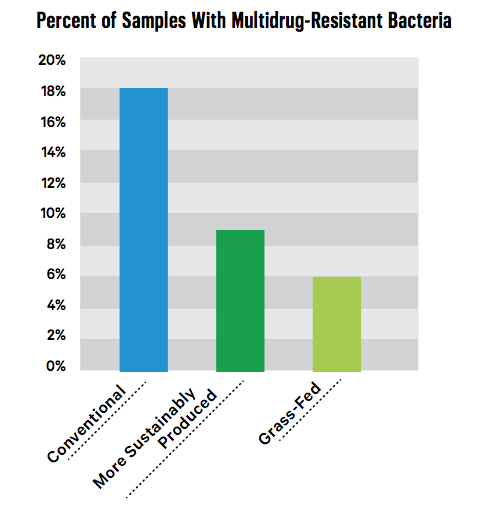Tests Find Drug-Resistant Bacteria In 18% Of Conventionally Raised Ground Beef Image courtesy of jpmarth

(jpmarth)
In addition to some folks’ love of bloody burgers, there are more concerns about ground beef than standard steaks and roasts because the grinding process takes bacteria that would have existed only on those cuts’ exteriors and mixes it in with the rest of the meat and fat.
For a new story in the upcoming issue of Consumer Reports, our colleagues tested 300 samples (458 pounds) of raw ground beef — 181 samples of conventionally raised beef and 119 samples produced using more sustainable processes, like antibiotic-free, organic, and grass-fed — from supermarkets, big-box, and “natural” food stores in 26 metropolitan areas across the country.
RELATED: How to cook a burger to a safe temperature that’s still tasty
 Each sample was tested for five common types of bacteria associated with beef: Clostridium perfringens; E. coli (including O157 and six other toxin-producing strains); Enterococcus; Salmonella; and Staphylococcus aureus.
Each sample was tested for five common types of bacteria associated with beef: Clostridium perfringens; E. coli (including O157 and six other toxin-producing strains); Enterococcus; Salmonella; and Staphylococcus aureus.
Both conventionally raised and more sustainably produced beef demonstrated the presence of these various bacteria, and all 300 samples contained bacteria that signified fecal contamination — from enterococcus and/or non-toxin-producing E. coli — which can cause blood or urinary tract infections.
Almost 20 percent contained C. perfringens, a bacteria that causes almost 1 million cases of food poisoning each year. About 1-in-10 samples had a strain of S. aureus that can produce a toxin that can not only make you sick, but which can’t be destroyed in the cooking process.
While only 1% of samples contained salmonella, when you consider the sheer amount of ground beef consumed nationwide on a yearly basis, you begin to realize why some 1.2 million a year fall ill from salmonella, resulting in 450 deaths.
 While there was little difference between conventional and sustainable beef when it came to the presence of enterococcus, salmonella, or C. perfringens, the other two pathogens in the tests were much more frequently found in conventionally raised beef. Tests found S. aureus twice as frequently in conventional beef samples, and E. coli showed up in only around 40% of sustainable beef, compared to around 60% for conventional.
While there was little difference between conventional and sustainable beef when it came to the presence of enterococcus, salmonella, or C. perfringens, the other two pathogens in the tests were much more frequently found in conventionally raised beef. Tests found S. aureus twice as frequently in conventional beef samples, and E. coli showed up in only around 40% of sustainable beef, compared to around 60% for conventional.
Many bacterial infections can be treated with antibiotics, but there is a growing concern about drug-resistant superbugs. A number of samples in the CR tests turned up the presence of bacteria that is resistant to multiple drugs, and there was a noteworthy difference between conventional and sustainably sourced beef.
RELATED: What terms like “Organic,” “Grass-Fed” and “No Antibiotics” Mean
Among conventionally raised beef, nearly 1-in-5 (18%) of the samples contained at bacteria that are resistant to at least two antibiotics. That’s double the rate of drug resistant pathogens found in more sustainably produced beef. When you look at beef that is just grass-fed, that drops again to only 6%.
“Better ways of producing beef from farm to fork have real impact on the health and safety of our food and the animals themselves,” said Urvashi Rangan, Ph.D., executive director of the Center for Food Safety and Sustainability at Consumer Reports. “Farming animals without antibiotics is the first step toward a more sustainable system. Grass-fed animals and good welfare practices produce fewer public health risks.”
Consumer Reports is calling on the FDA and the USDA to ban the daily use of antibiotics in healthy farm animals; ensure that meaningful labels are not undermined by labels like “natural” which have nothing to do with how animals are raised or what they ate; beef up (pun intended) USDA inspection practices, including having an inspector at every slaughter and processing plant; and ban the sale of beef containing disease-causing, antibiotic-resistant salmonella; and prohibit the presence of chicken waste in cattle feed.
Want more consumer news? Visit our parent organization, Consumer Reports, for the latest on scams, recalls, and other consumer issues.

